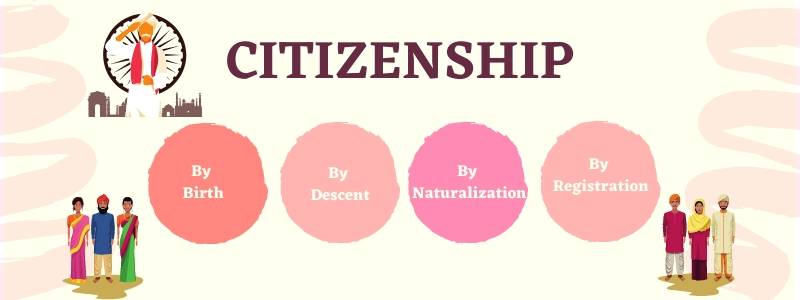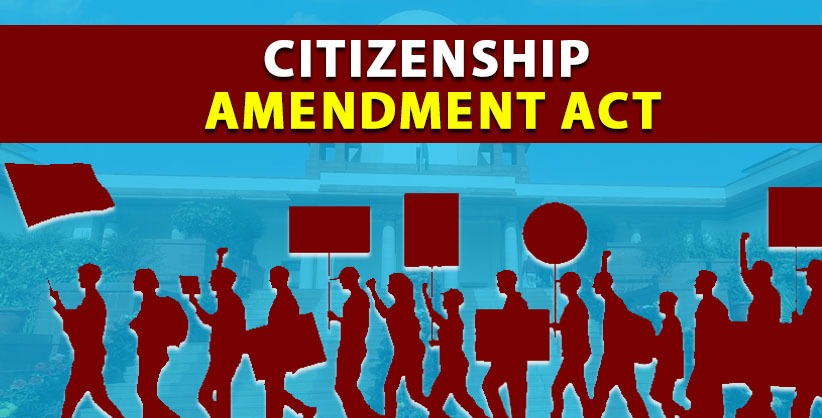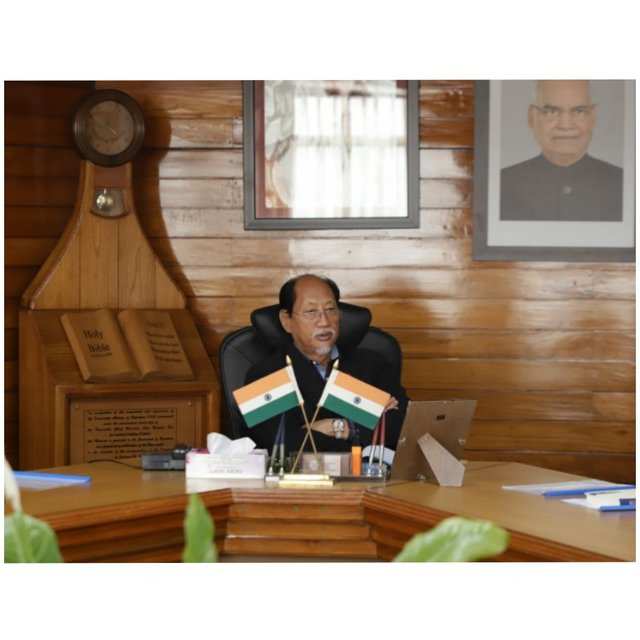Citizenship of India
ARTICLE 5 :
CITIZENSHIP AT THE COMMENCEMENT OF THE CONSTITUTION
At the commencement of this Constitution, every person who has his domicile in the territory of India and -
(a) who was born in the territory of India; or
(b) either of whose parents was born in the territory of India; or
(c) who has been ordinarily resident in the territory of India for not less than five years immediately preceding such commencement, shall be a citizen of India.
ARTICLE 6:
RIGHTS OF CITIZENSHIP OF CERTAIN PERSONS WHO HAVE MIGRATED TO INDIA FROM PAKISTAN
ARTICLE 7:
RIGHTS OF CITIZENSHIP OF CERTAIN MIGRANTS TO PAKISTAN
ARTICLE 9:
PERSONS VOLUNTARILY ACQUIRING CITIZENSHIP OF A FOREIGN STATE NOT TO BE CITIZENS
No person shall be a citizen of India by virtue of article 5 or be deemed to be a citizen of India by virtue of article 6 or article 8 if he has voluntarily acquired the citizenship of any foreign State.
ARTICLE 10:
CONTINUANCE OF THE RIGHTS OF CITIZENSHIP
ARTICLE 11:
PARLIAMENT TO REGULATE THE RIGHT OF CITIZENSHIP BY LAW
Citizenship of India: Acts and Amendments
The Citizenship Act, 1955: Acquisition
Indian citizenship can be obtained in the following ways:
- Citizenship conferred by birth
- Citizenship through descent
- Citizenship through registration
- Naturalization leads to citizenship.
- Territorial incorporation (by the Government of India)
By Birth
- Children born on or after July 1, 1987, but before the start of the Citizenship (Amendment) Act, 2003, are Indian citizens, as are all persons born in India on or after January 26, 1950, but before July 1, 1987 will have the status of a citizen. If either of his parents is an Indian citizen at the time.
- A kid whose parents are Indian at the time of birth or either of them is an Indian citizen at the time of birth and the other is not an illegal migrant is deemed to be an Indian citizen when the Citizenship (Amendment) Act, 2003 takes effect.
By Descent
- A person born outside of India between January 26, 1950, and December 10, 1992 must have had an Indian citizen father at the time of his birth.
- Either of the parents must be Indian citizens at the time of a child's birth outside the nation on or after December 10, 1992.
By Registration
- A person of Indian ancestry who has lived in India for at least seven years prior to applying for citizenship.
- A person who is married to an Indian citizen and has lived in India for at least seven years prior to applying for citizenship.
- Indian citizens' minor children.
By Naturalisation
- Residing in the country concerned for a certain period of time.
- Do not be a citizen of any country where Indians do not get citizenship by naturalization.
- Relinquishing the citizenship of other countries and accepting the citizenship of India.
- Should be well versed in any one of the languages mentioned in the Eighth Schedule.
- Be of good character.It is exempted under a special provision that if a person has done special work in the field of science, philosophy, art, literature, world peace or human development, then he can get citizenship by naturalization without fulfilling the above conditions.
Incorporation of Territory
- If any additional territory is added to India's territory or gets taxed. In 1974, Sikkim, for example, united with India. As a result, if the people of Sikkim become Indian citizens, the Indian government will ensure that the people of that region become Indian citizens.
- The act was amended four times: in 1986, in 2003, in 2005, and in 2015.
The Citizenship Act, 1955: Termination
- According to the Act, citizenship can be revoked in three ways:
- Renunciation:
- Any Indian citizen who is also a national of another country who renounces his Indian citizenship in the prescribed manner through a declaration ceases to be an Indian citizen.
- When a male person loses his Indian citizenship, all of his minor children lose their Indian citizenship as well.
- However, such a child may become an Indian citizen within one year of reaching full age by making a declaration of his intention to reclaim Indian citizenship.
- Termination:
- An Indian citizen's citizenship can be revoked if he or she knowingly or voluntarily adopts the citizenship of another country.
- Deprivation:
- In some cases, the Indian government may deprive a person of his citizenship. However, this does not apply to all citizens.
- It is only applicable to citizens who obtained citizenship through registration, naturalization, or by virtue of Article 5 Clause (c) (which is citizenship at commencement for a domicile in India and who has ordinarily been a resident of India for not less than 5 years immediately preceding the commencement of the Constitution).
- 2019 Citizenship (Amendment) Bill:
- Members of six communities — Hindus, Sikhs, Buddhists, Jains, Parsis, and Christians from Pakistan, Bangladesh, and Afghanistan — would be allowed to stay in India if they arrived before December 14, 2014.
- It also reduces the time required for citizenship from 11 to 6 years.
- These migrants were also exempted from the Passport Act and the Foreigners Act, according to two notifications.
- A large number of organizations in Assam have protested this Bill, which may grant citizenship to illegal Bangladeshi Hindu migrants.
- The bill's justification is that Hindus and Buddhists are minorities in Bangladesh and fled to India to avoid religious persecution, but Muslims are the majority in Bangladesh and cannot be said to be in the same category.
THANKS FOR READING..........






No comments:
Post a Comment